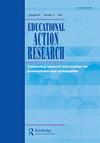Action research in the plural crisis of the living: understanding, envisioning, practicing, organising eco-social transformation
IF 0.8
Q3 EDUCATION & EDUCATIONAL RESEARCH
引用次数: 1
Abstract
ABSTRACT Finding ourselves in the midst of a plural eco-social crisis, this paper addresses roles and guiding questions for action research understanding, envisioning, practicing, and organising eco-social action, with the aim of renewing our human entanglements with the living ecologies, in which we are embedded. Driven by the aim of democratising eco-social transformations, climate- and biodiversity disasters are approached as symptoms of a plural eco-social crisis. From an eco-feminist position, this crisis concerns notions of mastery and extractivism eroding human and societal capabilities to sustain the inherent regenerative capacities of the living. Grounded in critical utopian action research, the paper addresses four different dimensions in action research for eco-social transformation: i) enabling social learning spaces to make visible the ways we are socially and ecologically related; ii) re-imagining how we want to live and relate in wider ecologies; iii) seeking alternatives to mastery through tangible practices; and iv) enabling new organisational forms for societal reorganisation. Building on concrete cases from urban planning to rural and regenerative practice, this paper describes how these different perspectives can mutually strengthen action research for eco-social transformation.多重生存危机中的行动研究:理解、设想、实践、组织生态社会转型
发现自己处于多元生态社会危机之中,本文阐述了行动研究理解、设想、实践和组织生态社会行动的角色和指导问题,目的是更新我们人类与我们所处的生命生态的纠缠。在生态社会转型民主化目标的推动下,气候和生物多样性灾害被视为多元生态社会危机的症状。从生态女权主义的立场来看,这场危机涉及控制和榨取主义的概念,这些概念正在侵蚀人类和社会维持生物固有再生能力的能力。本文以批判性乌托邦行动研究为基础,阐述了生态社会转型行动研究的四个不同维度:1)使社会学习空间能够使我们的社会和生态相关方式可见;Ii)重新想象我们希望如何在更广泛的生态环境中生活和联系;Iii)通过切实的实践寻求替代方法;第四,为社会重组提供新的组织形式。本文以从城市规划到乡村和再生实践的具体案例为基础,阐述了这些不同视角如何相互促进生态社会转型的行动研究。
本文章由计算机程序翻译,如有差异,请以英文原文为准。
求助全文
约1分钟内获得全文
求助全文
来源期刊

Educational Action Research
EDUCATION & EDUCATIONAL RESEARCH-
CiteScore
3.10
自引率
8.30%
发文量
48
期刊介绍:
Educational Action Research is concerned with exploring the dialogue between research and practice in educational settings. The considerable increase in interest in action research in recent years has been accompanied by the development of a number of different approaches: for example, to promote reflective practice; professional development; empowerment; understanding of tacit professional knowledge; curriculum development; individual, institutional and community change; and development of democratic management and administration. Proponents of all these share the common aim of ending the dislocation of research from practice, an aim which links them with those involved in participatory research and action inquiry. This journal publishes accounts of a range of action research and related studies, in education and across the professions, with the aim of making their outcomes widely available and exemplifying the variety of possible styles of reporting. It aims to establish and maintain a review of the literature of action research. It also provides a forum for dialogue on the methodological and epistemological issues, enabling different approaches to be subjected to critical reflection and analysis. The impetus for Educational Action Research came from CARN, the Collaborative Action Research Network, and since its foundation in 1992, EAR has been important in extending and strengthening this international network.
 求助内容:
求助内容: 应助结果提醒方式:
应助结果提醒方式:


